Japanese Your So Mean Winter Skies Are Clear Again
Howdy!
Beautiful in Japanese is 美しい (utsukushii) and beauty is 美しさ (utsukushisa).
But, if you lot want know some cute Japanese words, you're in luck.
The language is full of words and phrases that are not immediately translatable into English. Aesthetic Japanese words that don't accept an English counterpart and crave explanation.
In this guide, you'll learn fifty+ beautiful words and phrases.
So, let's leap in.
ane. 木枯らし Cold, Wintry Wind
- Pronunciation:
- Kogarashi
"Kogarashi" is a chilly, cold, wintry wind. Information technology lets you know of the arrival of winter. You know, the kind that sends the shivers downwardly your spine and gives you lot goosebumps.
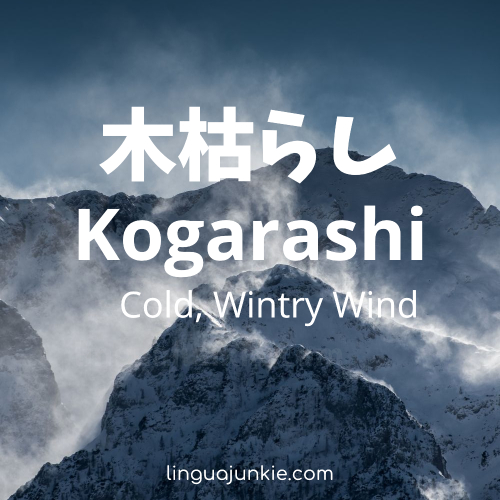
2. 木漏れ日 Sunlight filtering through the copse
- Pronunciation:
- Komorebi
When sunlight filters through the tree leaves and produces rays. You know that 木 stands for tree, 漏れ/もれ means leakage and the日 kanji stands for the sun. And so, tree leakage (of the) lord's day.
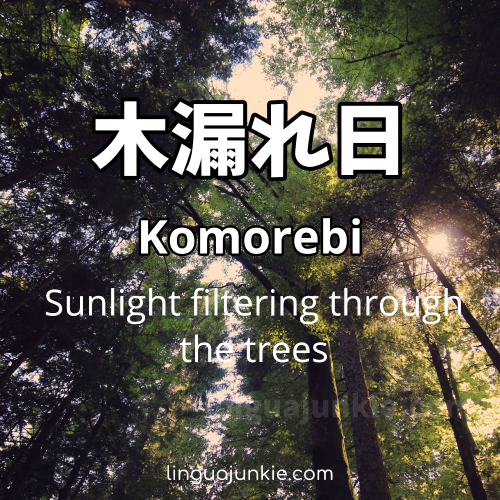
3. 物の哀れ Biting-sweetness of fading beauty
- Pronunciation:
- Mono no aware
物/Mono means "thing." And, "aware" looks like the English word, but it doesn't have the aforementioned meaning or pronunciation. It means pity, sorrow or grief. So this refers to the "bittersweetness of fading dazzler" – the acknowledged merely appreciated, sad transience of things. Kind of like the last day of summertime or the cherry blossoms – which don't last long.
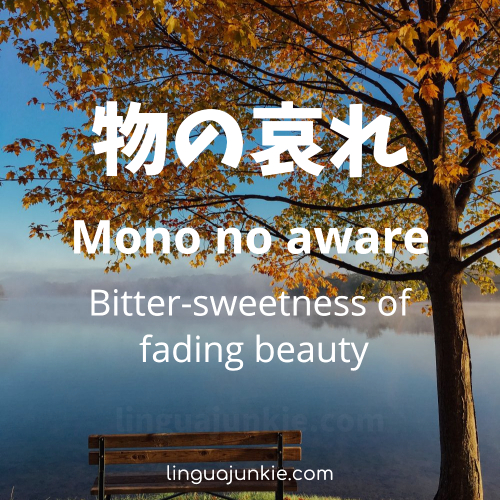
iv. 幽玄 An awareness of the universe
- Pronunciation:
- Yuugen
Literally it ways "subtle grace" or "mysterious profundity." This give-and-take has different meanings depending on context. But most of the time, it refers to a profound sensation of the nature of the universe – the oneness of all things – to the betoken where it affects you emotionally.
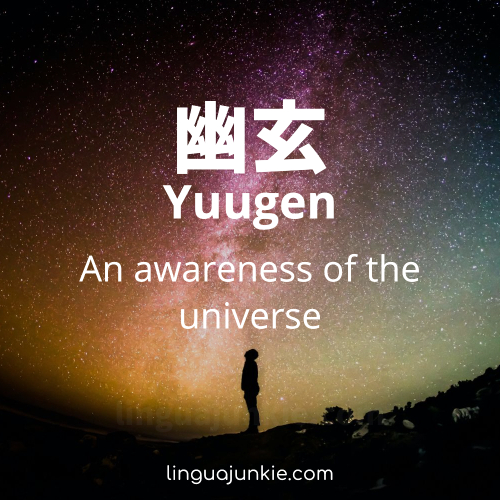
Sound vague and odd? Well, don't worry. To settle your mind, this word is not translatable and has no English language equivalent… so if yous're confused, it's okay.
5. 和 Harmony
- Pronunciation:
- Wa
This discussion ways peace or harmony. Information technology implies the importance to of avoiding disharmonize – and so every bit to maintain the (Wa) harmony. And information technology refers to Nihon and the Japanese fashion itself.

6. 改善 Continuous improvement
- Pronunciation:
- Kaizen
Literally, it means alter for better. Whether one time or continuously – this is non implied or intended. It'southward not until afterwards that it become continuous comeback by the Japanese business world. Toyota kicked it off.
So, now, it's simply a word (used by businesses) to describe the process of "always improving" and getting improve.
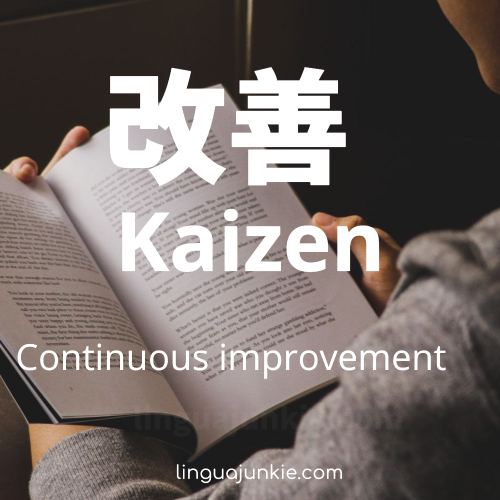
7. 紫 Purple
- Pronunciation:
- Murasaki
Yes, the color imperial. Why did information technology make the list of beautiful Japanese words?
But because of how information technology sounds to the ear. Say it with me – murasaki! Okay, there's more. Dorsum in the old, old days– say effectually the year 1400 – this color was the color of the upper course and but loftier level officials and Majestic family unit could wearable it. Then, this colour is a pretty big deal and a pretty beautiful Japanese word, in my opinion.
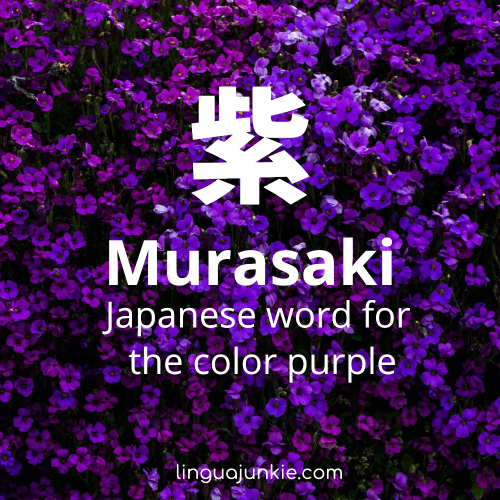
8. 森林浴 Forest Bathing
- Pronunciation:
- shinrin-yoku
And so, 森林/shinrin means forest and 浴/yoku stands for bathing. And this refers to being immersed in a forest or talking a walk through the woods. Information technology's something to exercise to relax, reduce your stress and improve your health.
And studies ostend that this indeed lowers blood pressure level and cortisol.
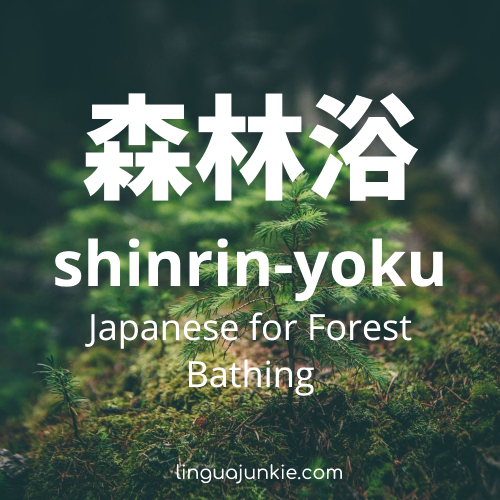
9. 奇妙 Strange, odd, or mysterious
- Pronunciation:
- Kimyou
This is a word that tin can describe things that are strange or odd. For case, if you suddenly received an bearding letter, you could use "kimyou." It can also be used to describe creepy locations like forests, cemeteries, or houses.
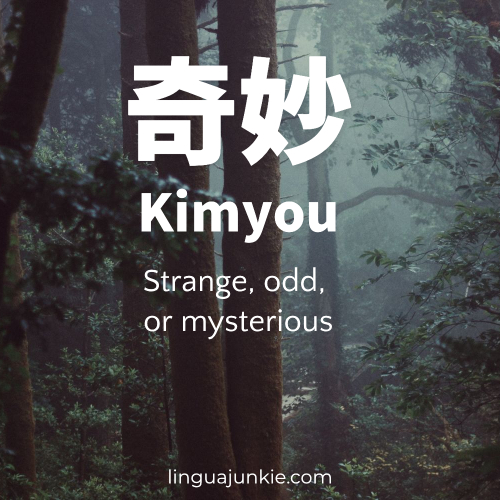
10. 浮世 Floating World
- Pronunciation:
- ukiyo
Now, this isn't a recent term and yous won't hear information technology much. Information technology'south rooted in Japan's history. It literally does mean "浮 – bladder" and "世 – globe/order." Although information technology can also exist interpreted as "transient world" or "fleeting life." Basically, this give-and-take was used to describe Japanese life-style in Edo-catamenia Nippon, where normal people escaped the pressures of the samurai land to entertainment/pleasance districts (whether theater, tea-houses, etc.).
You won't hear information technology much in everyday life.
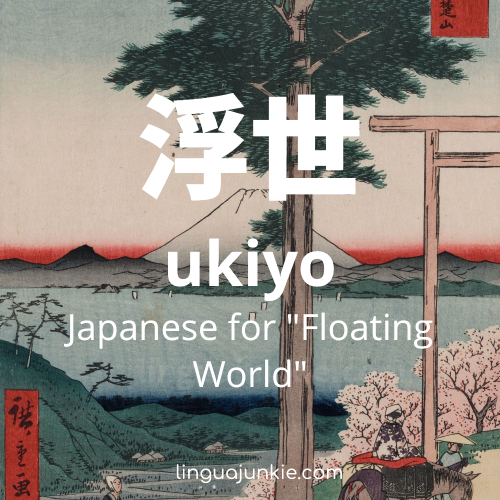
11. 花吹雪 Cherry Blossom Blizzard
- Pronunciation:
- Hanafubuki
花 means flower, petal (or cherry blossom) and 吹雪 means blizzard or snowstorm. However, this typically refers to Cherry-red Blossoms (Sakura) and how their petals come floating downward, slowly, en-mass, as if a snow tempest or blizzard.
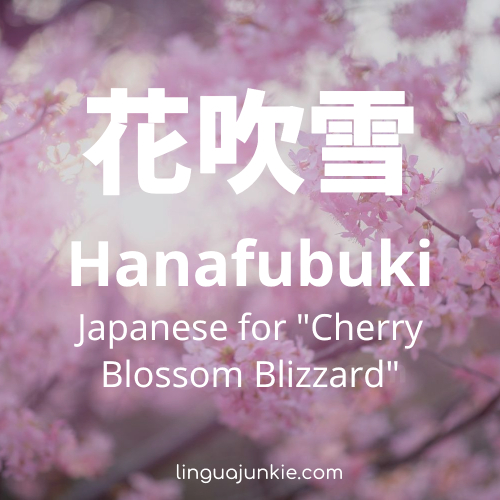
Here's a sexy example – if it moves yous, you lot tin can say y'all felt "yugen" or that it's "mono no enlightened."
12. 風花 Flurry of Snow in a Articulate Sky
- Pronunciation:
- Kazahana
If you go by the kanji, the first ane stands for wind and the other one is for flowers. Except, this word is used to describe snow flurries in the wind. Why the flower comparison though? Well, considering it's kind of like petals in the wind.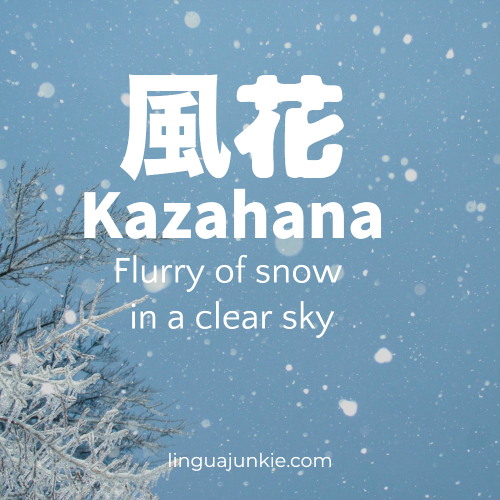
thirteen. 生き甲斐 Reason for Being
- Pronunciation:
- ikigai
As the Japanese say, everyone has an ikigai. It's what gets you up in the morn. Information technology'due south what moves you lot. What makes your life worthwhile. Work. Hobbies. Goals. Taking care of kids. Learning Japanese. It'due south probably why I'm writing this at 3:17AM on a Saturday morning! Knowing your ikigai might require a lot of introspection and search. At present, permit's break information technology downwards:
- 生き – Iki – Meaning: living or being alive
- 甲斐 – kai (though it'south inverse to gai) – meaning: worth or apply
What's your "ikigai?" Leave a comment.

14. 一期一会 Treasure every encounter, for it volition never recur
- Pronunciation:
- ichi-go ichi-e
This is actually a Japanese proverb; a Zen Buddhist 1.
Literally, it means – one time, one meeting. Unremarkably, it's translated as "i chance in a lifetime." Merely the BEST translation is: Treasure every run into, for information technology will never recur. And so, that meeting you had with a friend or someone… that EXACT moment and everything that happened will never, always happen again in this life. It was 1 of a kind and hence information technology's worth treasuring.
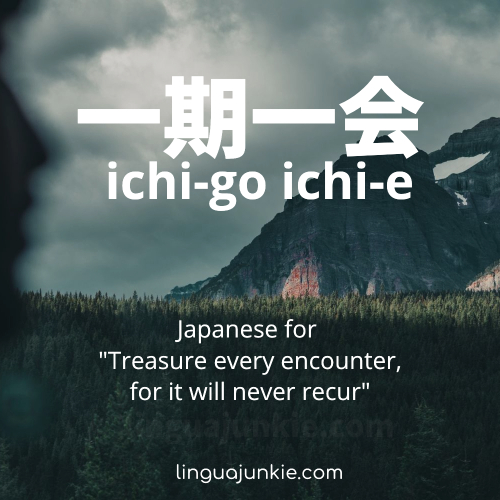
Next on the list of beautiful Japanese words…
xv. 恋の予感 Premonition of Beloved
- Pronunciation:
- Koi no Yokan
This is sort of like love at kickoff sight but not really. At that place's more than. It's non a sappy, head-over-heels, heart-pounding, collywobbles-in-stomach "love." It'southward a sense you get when first coming together a person – that it'south INEVITABLE that you are going to be in dearest in the future. Even if y'all experience no love right at present.
- 恋 – koi – honey
- 予感 – yokan – premonition
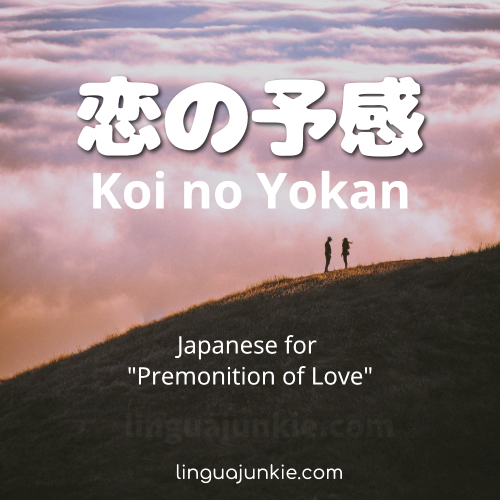
sixteen. 侘寂 Dazzler in imperfection; the accepting of life and death
- wabisabi
Wabisabi describes a manner of looking at the earth. It's about accepting the transcience and imperfection of things. And thus, for the time nosotros have left, seeing beauty in the things around us. For example, take a rough, cracked, asymmetrical, simple piece of pottery – seeing beauty in that is wabisabi.
This would be a hard concept to accept for people that similar new, shiny and perfect things.
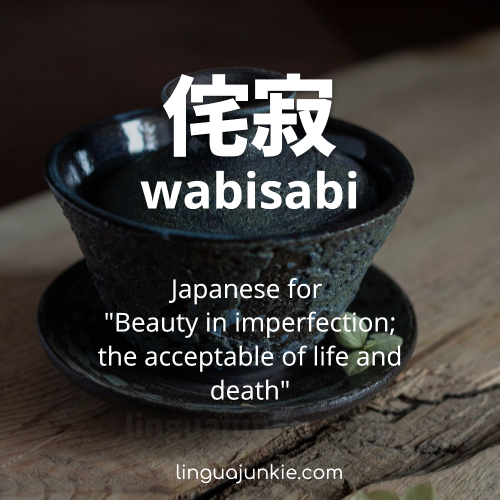
17. 川明かり Glow of a river in darkness
- Pronunciation:
- kawaakari
It can be the reflection of the moonlight on the river. Or, information technology can exist the gleam of calorie-free on the river during dusk. Hither, 川/kawa ways river and 明かり/akari means light.
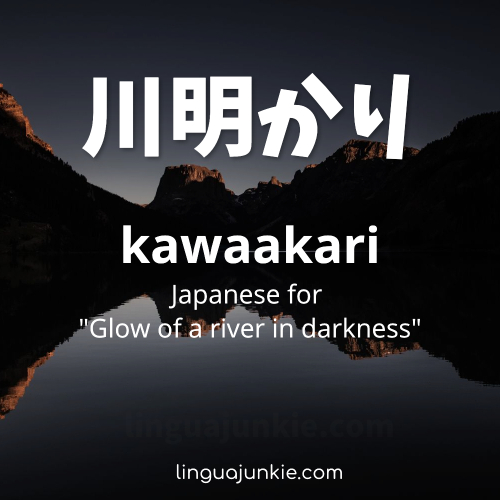
eighteen. 行逢りば 兄弟 In one case we meet, we become brother/sis
- Pronunciation:
- Ichariba chode
This is the spirit of hospitality and friendliness to strangers.
And more importantly, y'all get from strangers to brothers or sisters. That kind of hospitality!
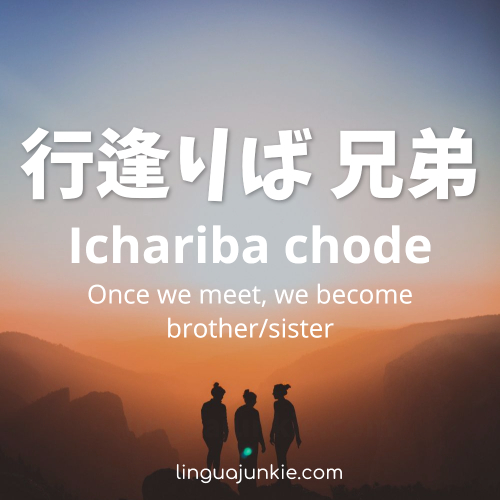
19. 金継ぎ Repair with Aureate
- Pronunciation:
- Kintsugi
Besides known as kintsukuroi. This is the art of repairing pottery with gold or silver and making something broken beautiful – usually pottery. This is an example of wabisabi where something imperfect is withal cute!
So with kintsugi, the big point is… you lot can accept something imperfect or broken, and make information technology EVEN more beautiful than ever.
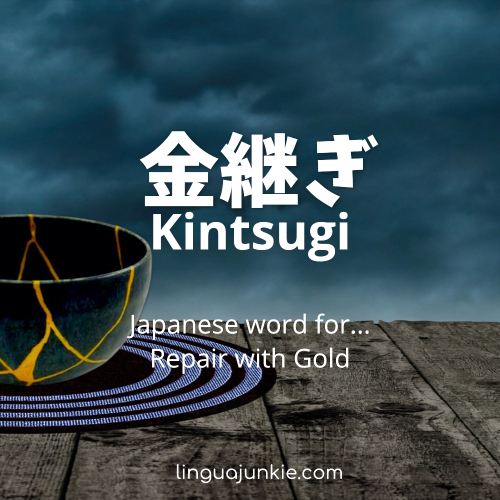
20. 鏡花水月 Bloom in the mirror; moon on h2o
- Pronunciation:
- Kyouka suigetsu
Both, a bloom in the mirror and a moon'south reflection on h2o tin can't be touched. Then this Japanese phrase refers to something that'southward visible but tin can't be touched. Something you can experience (for example, beauty or an emotion) only can't describe in words.
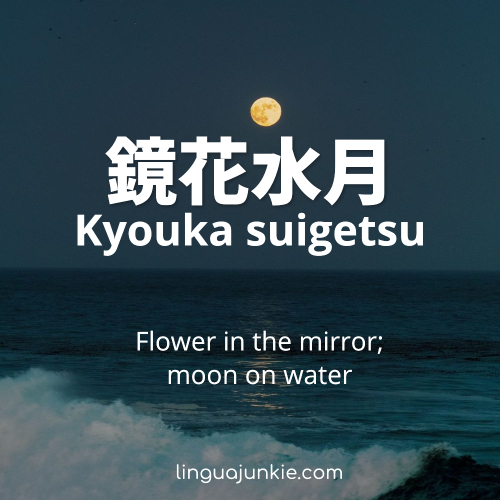
21. 高嶺の花 Flower on a high summit
- Pronunciation:
- Takane no hana
Literally, this ways 高嶺/high peak and 花/flower. What it TRULY means is a "goal that'south unattainable." Something beyond your accomplish, like a blossom!
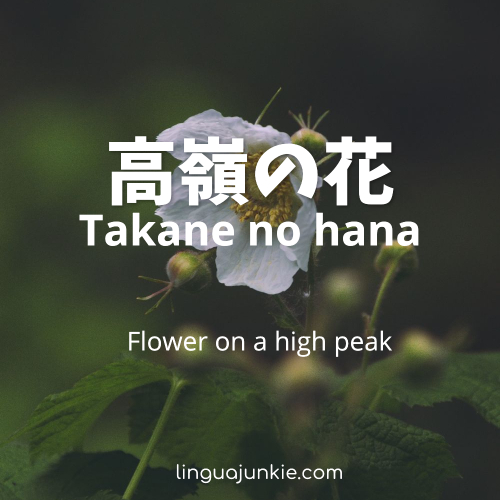
22. 風物詩 Things which remind of a season
- Fuubutsushi
So, anything – feelings, scents, images – that bring memories, thoughts or apprehension of a detail season. Kind of like when you scent that crisp/burning-similar scent in the air, long before snow starts falling, and yous know winter is coming. The Japanese love their seasons so there are unlike foods, different fruit (that are grown) products and decorations for different seasons.
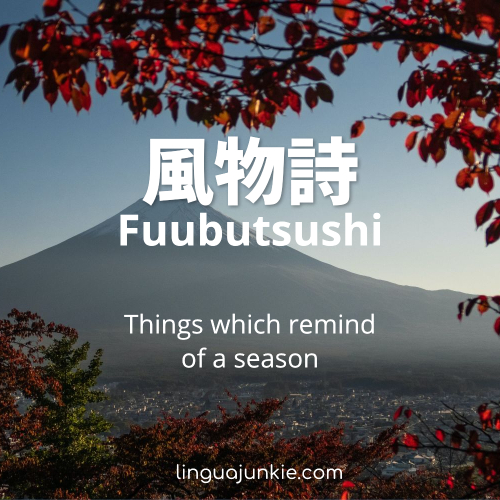
23. 積ん読 Ownership/Piling Up Books without Reading
- Pronunciation:
- Tsundoku
You know how you add as well many shows and movies to your Netflix queue without watching? Or buy too many vegetables that you never eat? The Japanese have a word for this, except with books. Any book lover knows this. They have books they want to read. They want another books. And with the overwhelm, they don't go around to any and let them pile up.
Tsundoku is a combination of the verb 積む (tsumu – to pile up), and 読 (doku – reading.)
This is one of the cute Japanese words that I can relate with.

24. 居留守 Pretending You lot're Not Home
- Pronunciation:
- irusu
This give-and-take is used to describe yous when yous flake out on the person at your doorstep. They ring the doorbell. *Ding-dong.* And yous, all of a sudden grow very, very quiet, plough off the lights and promise they go away.
This word is a noun and literally means "pretending to be out."
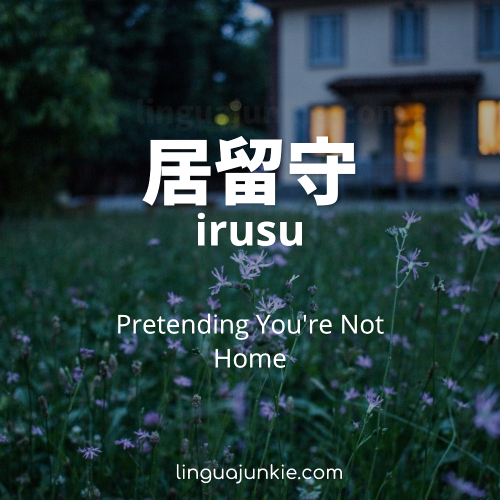
25. 懐かしい Nostalgia/Nostalgic
- Pronunciation:
- Natsukashii
Literally, this word means "cornball" and is an describing word. But, this carries a lot more meaning and emotion to the Japanese. People don't normally blurt out "oh, how nostalgic" in English language, because no-i likes nostalgia. Information technology's seen as negative. For the Japanese, it'southward something that brings back memories and warms the eye.
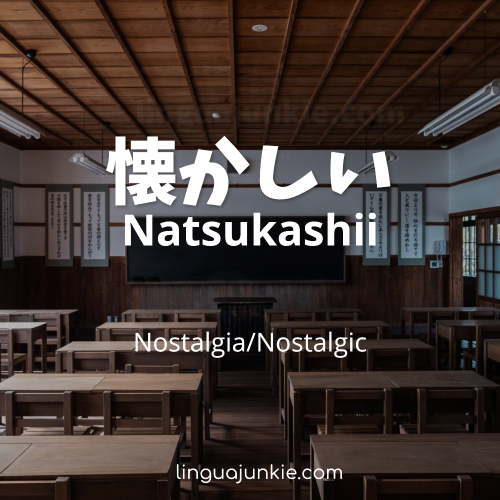
26. 食い倒れ Eating Yourself Into Defalcation
- Pronunciation:
- Kuidaore
Allow's pause the phrase apart. Kui (食い) means to swallow and 倒れ (daore) is a bad debt or collapse. It also comes from the verb 倒れる (daoreru) which ways to become broke. How is the word used? It applies to foodies and people that dear going out to eat.

27. しょうがない It can't exist helped
- Pronunciation:
- Shoganai
This is a very mutual and a very Japanese expression. When is information technology used? People use information technology equally "I can't practise annihilation virtually it. I requite up." Then, it's used when things are out of your control (and sometimes when you just don't want to try hard.)
As much as is this an interesting Japanese phrase, it'south also disliked past others due to the overall "I won't fifty-fifty try" spirit it carries.
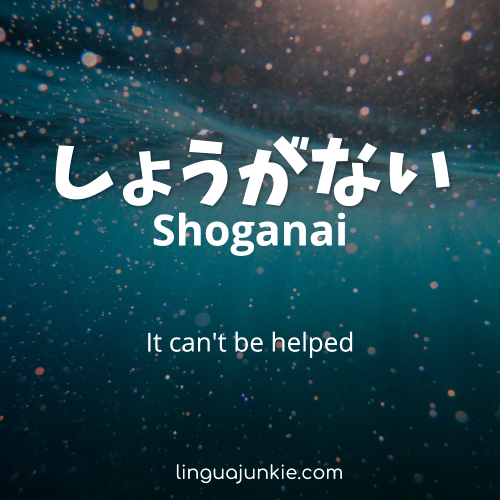
28. 無礼講 Putting everything aside to be yourself
- Pronunciation:
- Bureikou
Interestingly, this word sounds like "break." And indeed, information technology is a break. This word represents a situation where you can speak freely, act freely and nearly importantly, bask yourself without worrying about your social condition, relation to others, pressure or authority.
This happens at Japanese company drink-outings where the workers and their bosses get boozer and honest with each other.
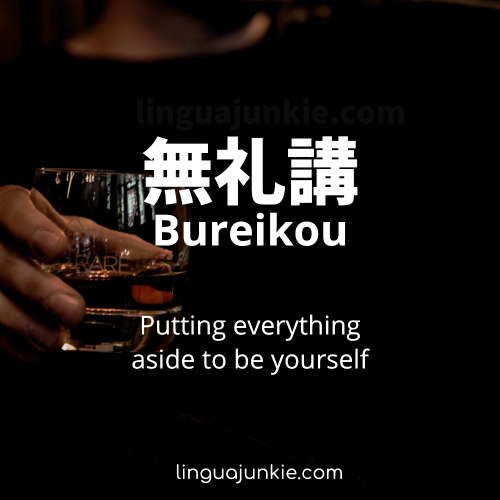
29. ありがた迷惑 An unwelcome favor
- Pronunciation:
- Arigata meiwaku
Politeness and maintaining harmony is important in Japan. And so, when someone does something prissy. for someone else… Japanese people are compelled to render the favor. Even if they didn't ask for the nice thing. This phrase captures that mix of needing to repay the favor as well as the badgerer of having to practise it.
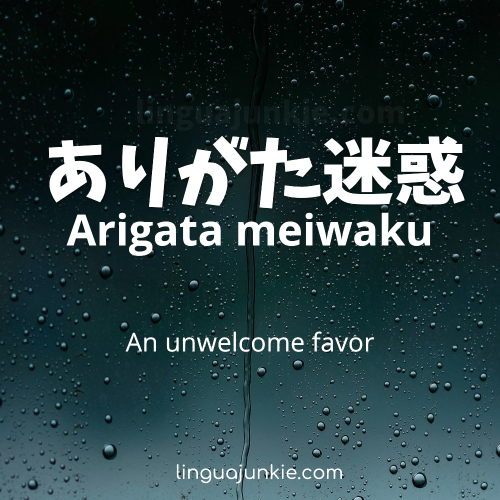
30. 渋い Erstwhile School Absurd
- Pronunciation:
- Shibui
Old schoolhouse cool like Frank Sinatra, Al Capone, disposable . However, this can also accept a negative connotation; "stuff only old people like."
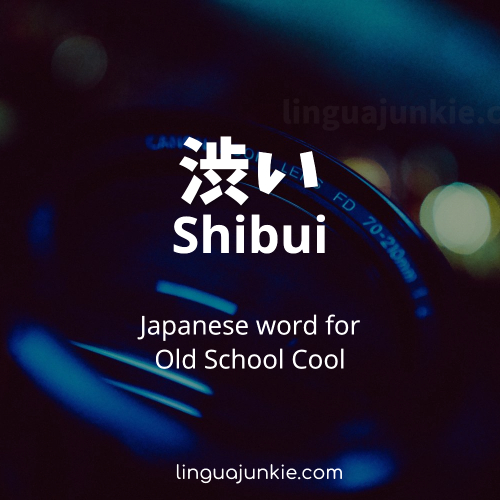
31. 微妙 "Fragile, subtle, fine or …Eh"
- Pronunciation:
- bimyou
Bimyou is quite a versatile word. And despite it being one of the called beautiful Japanese words, y'all also should acquire it. It'south used in daily life. There are many uses. It can be used to talk about "subtlety" like a subtle alter or "eh" if you want to comment on something's quality. In other words, it's "eh" or not so expert.
Given this discussion's vagueness, it'due south also used as a way to say no or be vague about things. "Hey girl, Tin I see you lot tomorrow?" "Well, it'due south a bimyou…"

32. 引き籠り Modern Solar day Hermit
- Pronunciation:
- Hikikomori
This is a word used to draw someone that'southward a recluse and stays in. Beautiful Japanese words bated, it's quite an issue in Japan. This word refers to adults or adolescents who have willingly pulled out of social life, interaction and alive in extreme isolation. No friends. No contacts. The Japanese Ministry of Health designates this word for anyone that hasn't left their home in over 6 months.
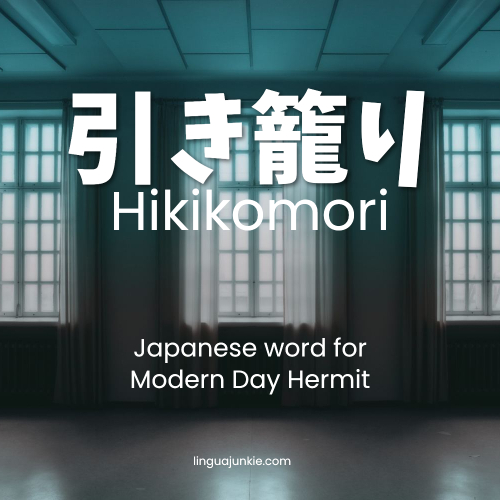
33. わすれもの Forgotten thing
- Pronunciation:
- Wasuremono
Let'due south intermission this discussion in half. "Wasure" means "forget" and "mono" means thing. So, information technology literally represents items that are forgotten and list
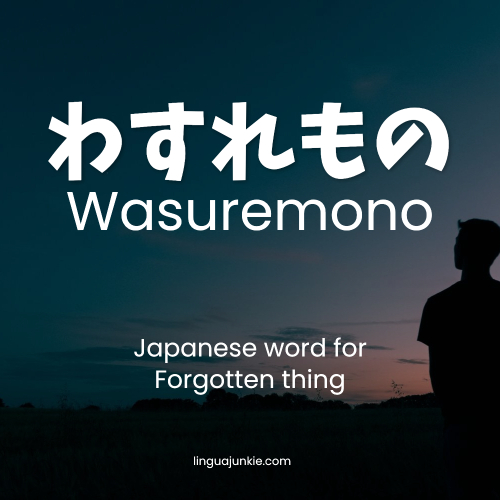
34. 真面目 Hardworking
- Pronunciation:
- Majime
Anywhere else, if you call someone diligent, hardworking and dedicated to a goal, in that location's a negative flipside to information technology. They're seen as party poopers that won't have any fun. In Nihon, "Majime" carries positive meaning.
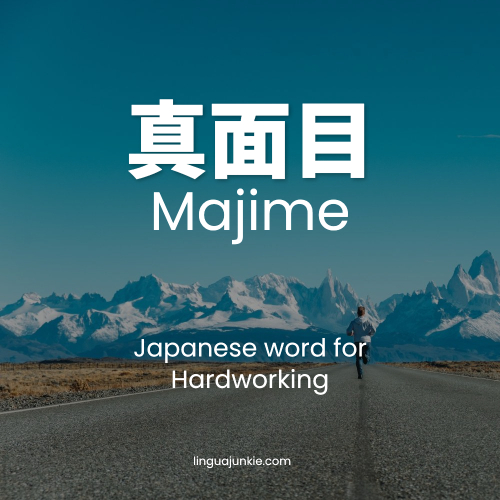
35. よいしょ! Allow's do this!
- Pronunciation:
- Yoisho!
This word is a "kakegoe" or proverb of encouragement to yourself or others. In fact, it's more so an interjection than anything. Kind of like.. "Alright…" "Well…" "Allow's do this" and such… depending on the context.
Kind of sounds like "yoshhh."
You'll often hear Japanese people say it to themselves before they kickoff piece of work. You volition also hear it when people plop down into a chair or couch subsequently coming abode from work. Mostly, it'southward said before or just every bit something is about to be done — before you lift something heavy or as you sit down down after a long day. It varies.

36. バックシャン A woman who is beautiful from behind
- Bakkushan
This is one of the well-nigh interesting "beautiful Japanese words" here. Information technology's a combination of 2 words. First, the English word "back." 2nd, the German give-and-take, "schön," which means beautiful. So, beautiful from the back.
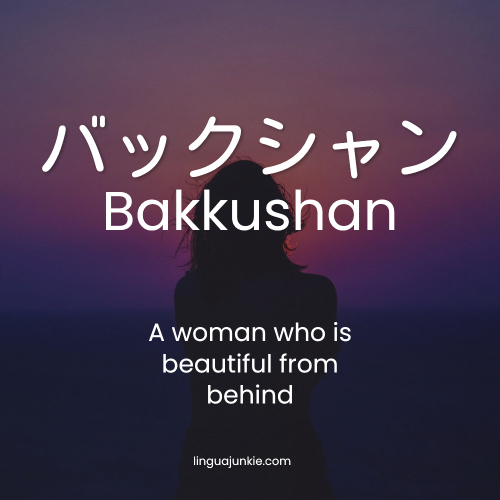
37. おもてなし Japanese Hospitality
- Pronunciation:
- Omotenashi
This discussion goes above just hospitality. Information technology carries a sense of selflessness obligation to the client without expecting anything in return. You can see examples of this when shop staff bow to yous upon entry. Or, when restaurant staff cheerfully yell "welcome." It's fifty-fifty as subtle equally a toothpick automatically provided inside your pair of chopsticks. Careful thoughtfulness, eh?
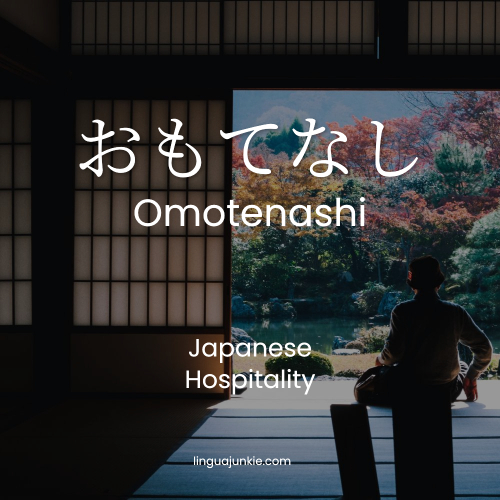
38. 蛇足 Useless as snake legs
- Pronunciation:
- dasoku
So, the discussion means useless. Where do the snake and legs come from? The first character, 蛇, represents snake and the second i, 足, is legs. When you want to say something is useless or redundant, employ this.
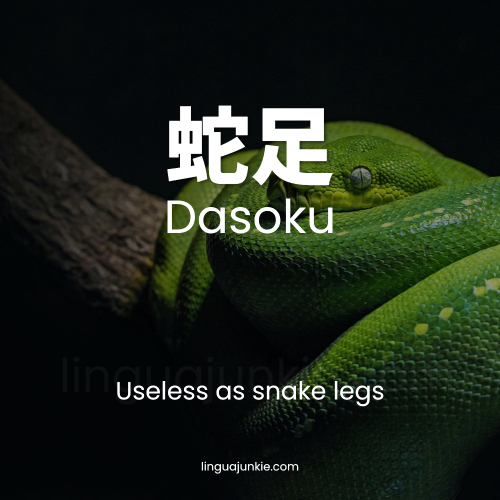
39. 口寂しい Longing to have something in your oral cavity
- Pronunciation:
- kuchisabishii
Literally, this means "rima oris lone." And this is in regards to food. Then, this is when you eat when you're non hungry but because you have nix ameliorate to practise.
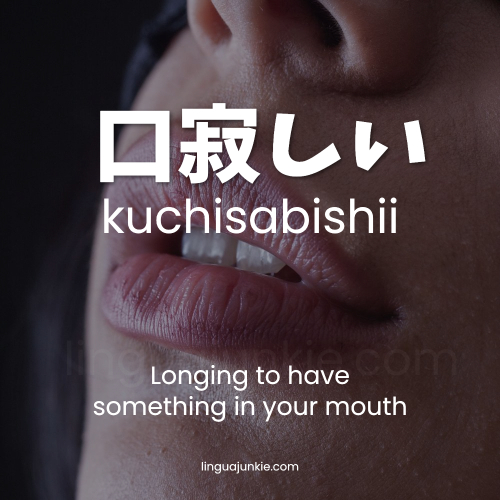
40. 辻斬り Killing a passerby to examination a new sword
- Pronunciation:
- Tsujikiri
If you're thinking that this has to be a samurai sword discussion, you're correct. When one buys a new car, they take it for a drive. Bed? They accept information technology for a nap. And a sword? Well, y'all do what swords are designed to do. If yous were a samurai back in the day, where else would you discover another person? While passing them past on the street!
So, tsuji means street or crossroad and the second part, kiri, is to slice or kill.
Definitely ane of the more "fun" beautiful Japanese words hither.
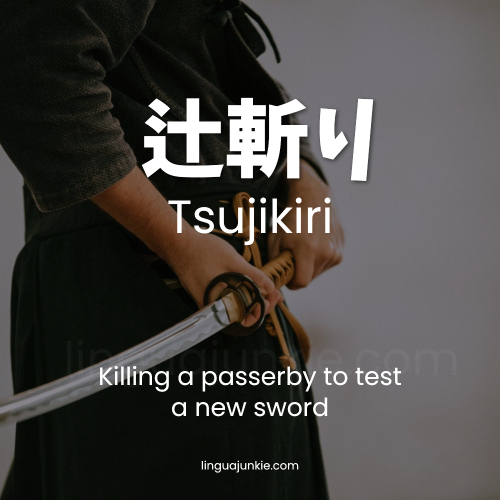
41. 紅葉 Leaves irresolute color
- Pronunciation:
- kouyou
The first character means "scarlet" or "reddish" and the second i means "leaves." Merely, in general, this term is known as the irresolute of colors of leaves in Autumn. In Nippon, this is a pretty big deal also, alike to admiring the cerise blossoms in the Spring.
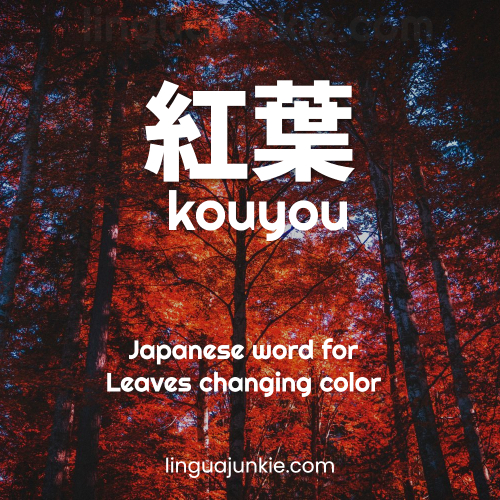
42. いただきます I humbly receive (food)
- Pronunciation:
- Itadakimasu
I mean, who doesn't want to receive food? The Japanese say "itadakimasu" before they consume. This is what's known as a Japanese set up phrase — a phrase used with certain occasions… like eating! But, as with all beautiful Japanese words, this 1 has more nuance to it. It likewise includes thank you and gratefulness to everyone who was responsible in making the nutrient. Farmers growing the veggies. Those that have delivered it to the urban center. And your cook too.
This word also goes back to the Buddhist concept of being respectful to all things.
Yous'll usually run across this translated as "bon appetit" simply translations won't become the meaning and feeling right.
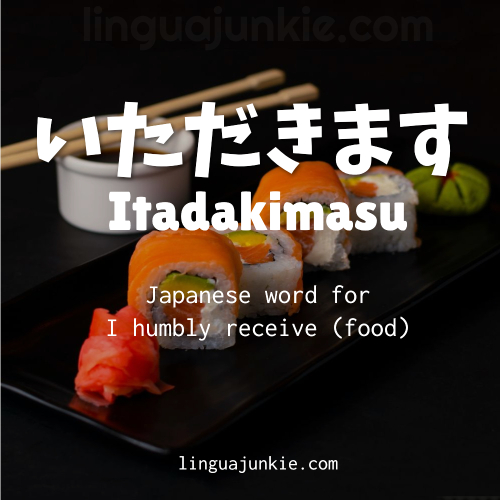
Hither's another one of my favorite cute Japanese words.
43. おじゃまします I will disturb y'all in your home
- Pronunciation:
- Ojamashimasu
Jama means disturbance. Shimasu means to practise. Information technology but ways "I will bother yous." However, you use this when you enter someone'south home. It's a sign of respect for the person yous are visiting and their home.

44. お疲れ様です "it's been tough and y'all must be tired"
- Pronunciation:
- Otsukaresama desu
This is another Japanese set phrase.
Like the 2 words to a higher place, this ane also is a native Japanese saying and cannot exist translated with one or two words alone. Otsukare is often used at the end of the day to others, like coworkers, squad players or students where both of you literally worked hard.
It'south a parting greeting simply is also used to acknowledge that "you take worked hard."

45. もったいない "What a waste matter…"
- Pronunciation:
- Mottainai
While this start and foremost is used to express regret over waste product – similar food, in that location are other uses besides. You tin use it to say that in that location'due south as well much of something, and thus it's a waste. Or, you can apply it to say you are "mottainai" in the event that someone is too adept for y'all.
Actually, this is a common way to say "it'southward not you, 'information technology'south me" as a style to reject someone in Japanese.

46. 猫舌 Having a true cat's tongue & a dislike for hot nutrient & drink
- Pronunciation:
- nekojita
The existent meaning of this discussion is just a "dislike for super hot foods and drinks." But, for some reason, it'due south made of ii characters. The first one ways true cat. The second is tongue. While nosotros have no proof that cats hate hot/warm nutrient, that's the mode the phrase goes. So, if you can't handle that, you're said to take a cat's tongue.

47. 落葉 Fallen Leaves
- Pronunciation:
- Rakuyou
This is another fall-themed word. Why is information technology on my list of beautiful Japanese words? Well, in English, information technology takes ii words to limited it. In Japanese, it's just one. And because it's one, it carries a stronger paradigm of autumn, fallen leaves and the atmosphere.
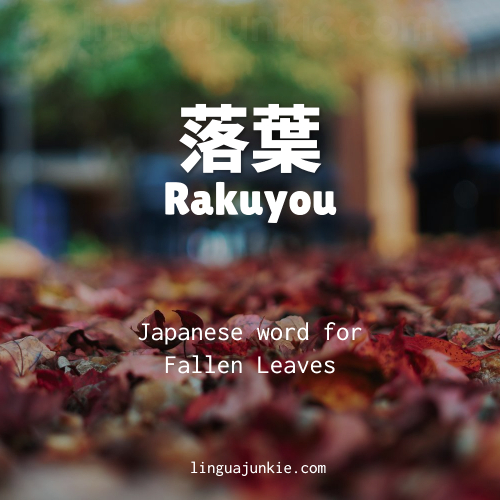
48. 月見 Cherry Blossom Viewing
- Pronunciation:
- Hanami
Hanami is literally translated as "bloom viewing." But, information technology is more often than not used for going to see the Scarlet Blossoms (also known as Sakura). This is a Japanese tradition where many Japanese caput out to encounter the Sakura in their full bloom.
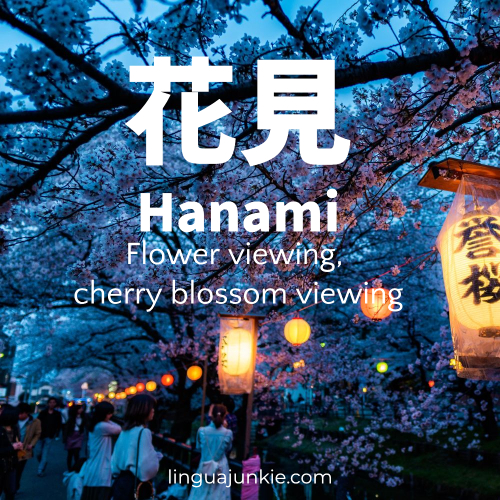
49. 月見 Viewing the moon
- Pronunciation:
- Tsukimi
Just similar at that place's a "cherry blossom viewing," in that location'southward also a moon viewing. When does this happen? Usually in September or October when there'due south a full moon.
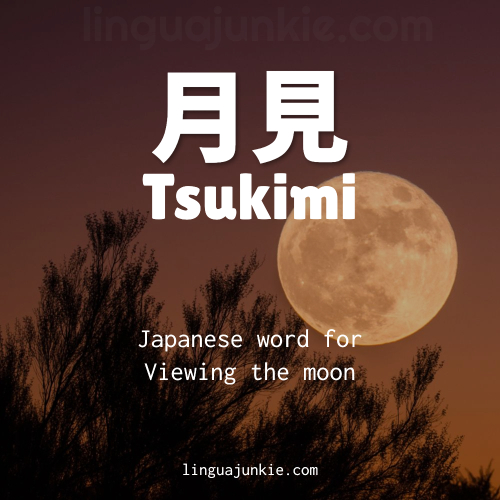
50. 雪見 Snow viewing
- Pronunciation:
- Yukimi
You lot heard of ruby blossom viewing. Yous heard of moon viewing.
Well, then at that place is "Yukimi" which ways snow viewing… and watching the snow come up downwardly. For the Japanese, this is preferably done while in a warm onsen bath/hot spring resort with a view.

51. 紅葉 Japanese blood-red maple leaves
- Pronunciation:
- Momiji
Selection autonomously the characters and this just means "crimson" and "leaves." However, say this give-and-take out loud. Momiji. Information technology's dainty sounding give-and-take and hence made it on the list!
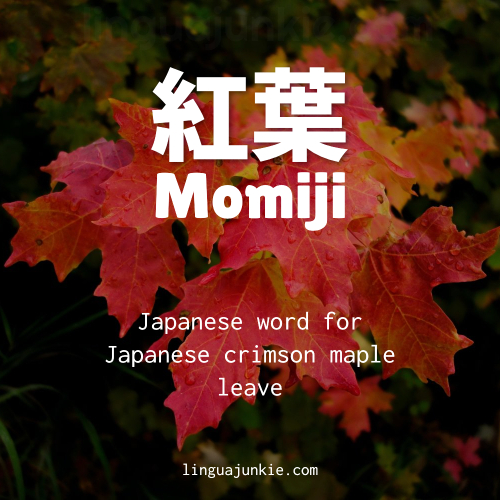
52. 猫かぶり Wolf in sheep's clothing
- Pronunciation:
- Nekokaburi
This means "feigned innocence or naïveté." In other words, the person is pretending to be dumb and innocent, like a wolf in sheep'southward vesture. However, the Japanese word here is totally different. If yous option apart the words, it ways "to put on a true cat." Why cat? Well, know how cats make up one's mind to whack items off tables and look at you like they've done cipher wrong?
That's where it comes from.
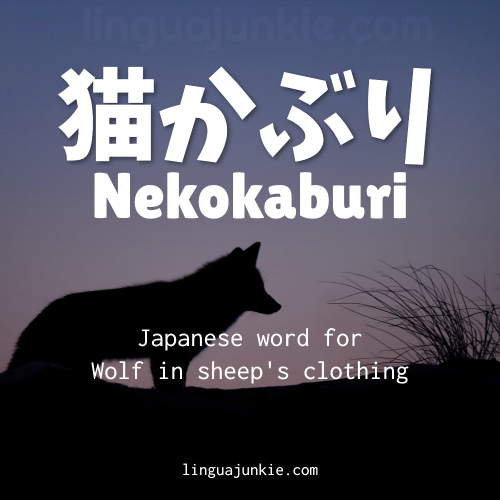
53. ボケット Gazing vacantly into the distance, without thinking.
- Pronunciation:
- boketto
This word comes from ぼけとする/boketosuru – to fantasize. Boke, interestingly enough, also means fool. But, don't let that tarnish this discussion. It's nice non to think sometimes. Some things are not worth thinking too much about!
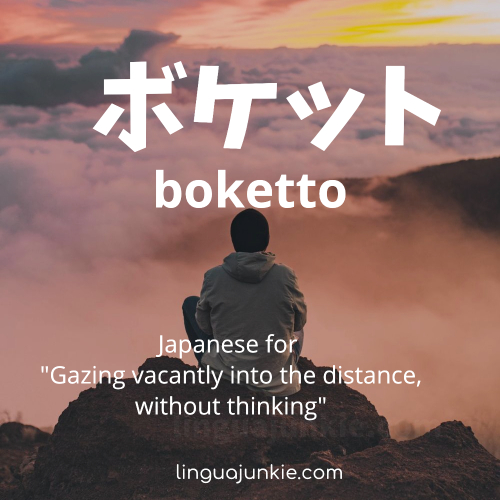
54. じがばち Red-banded sand wasp
- Pronunciation:
- jigabachi
You're wondering – how in the World did a wasp land on the list of cute Japanese words?
Well, this article is sugariness like love and it but buzzed over hither.
I know, I know. No deep profound meaning. No sexy message that volition send shivers down your spine. Okay, fine. But, say it with me… out loud… jiga-bachi. I think it'south a pretty prissy sounding give-and-take. Information technology feels powerful! JIGA. BACHI. Okay, it's a personal favorite, and so I stuck it last.
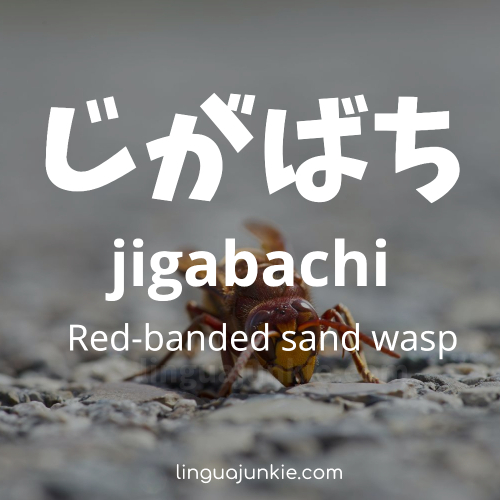
Done!
Now you lot now the elevation fifty beautiful Japanese words.
Yep, yous're right – in that location are TONS more. Simply this is a quick, easy lesson for Beginners that want to start slowly.
So… here'south my question to you:
Do you have any favorite cute Japanese words? Any phrases that I missed or that you want me to add to the list?
Let me know in the comments and I'll add them.
Want to acquire even more words and acquire Japanese?Check out my other posts:
- Japanese MP3 Lessons & Audio
- Japanese PDF Lessons
- How To Introduce Yourself in Japanese
- Or, stop reading manufactures and check my recommended Japanese learning programme below.
– written past the Main Junkie
Source: https://www.linguajunkie.com/japanese/beautiful-japanese-words

Post a Comment for "Japanese Your So Mean Winter Skies Are Clear Again"